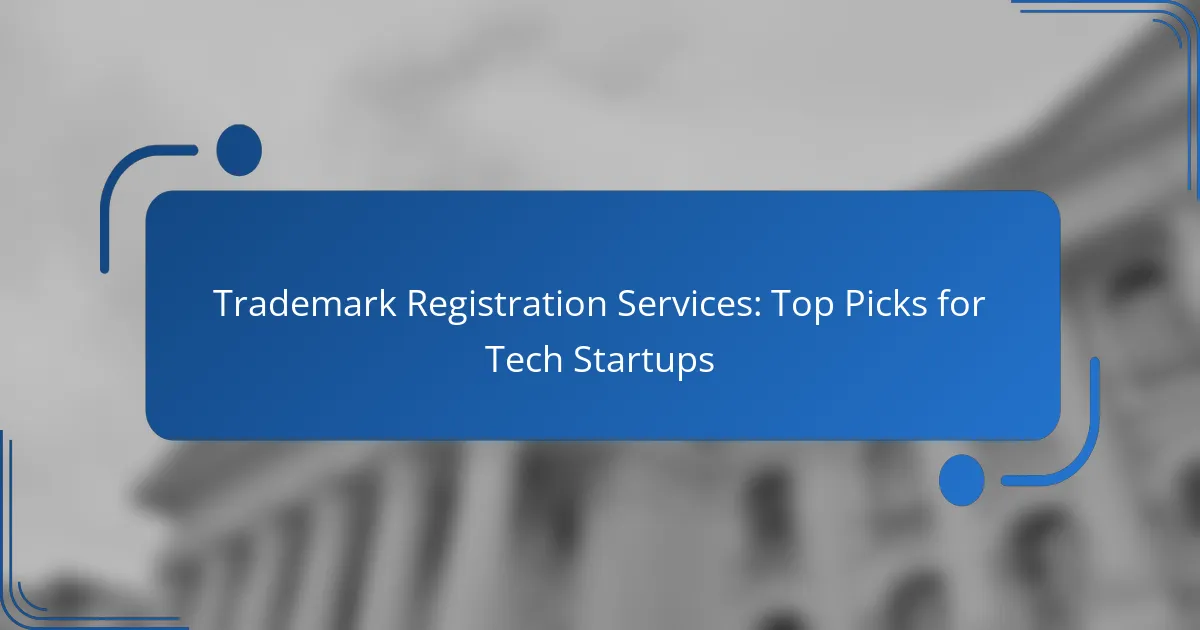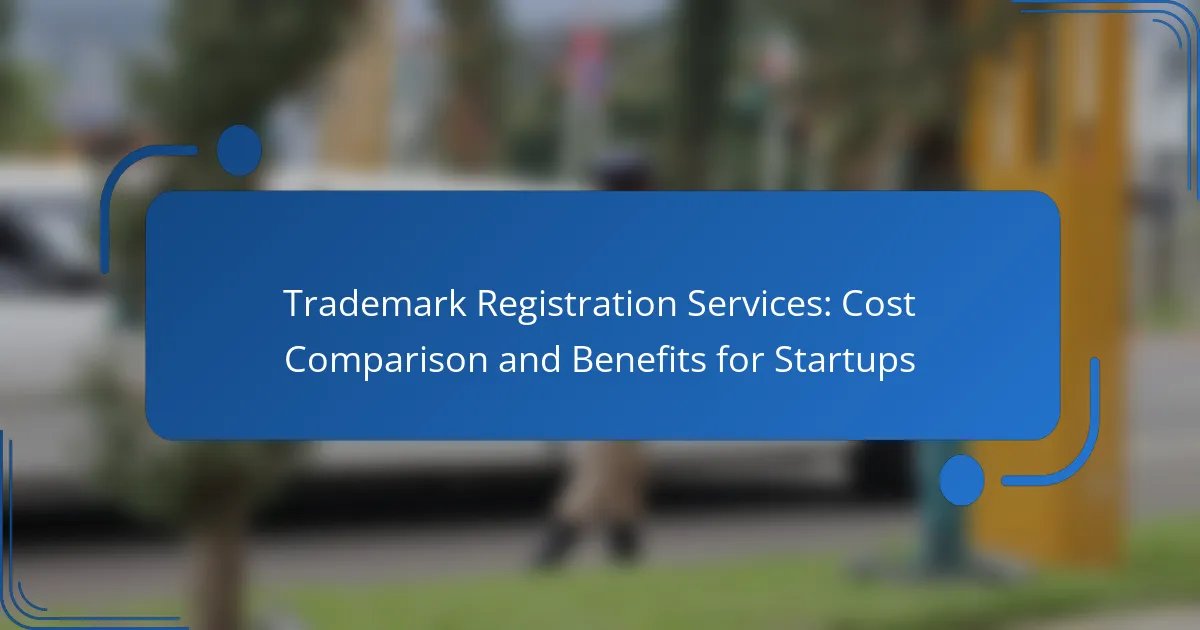For e-commerce brands, selecting the right trademark registration service is crucial for protecting their unique identities and enhancing market presence. These services streamline the application process, provide legal guidance, and ensure compliance with regulations, ultimately safeguarding brands against infringement and building customer trust.
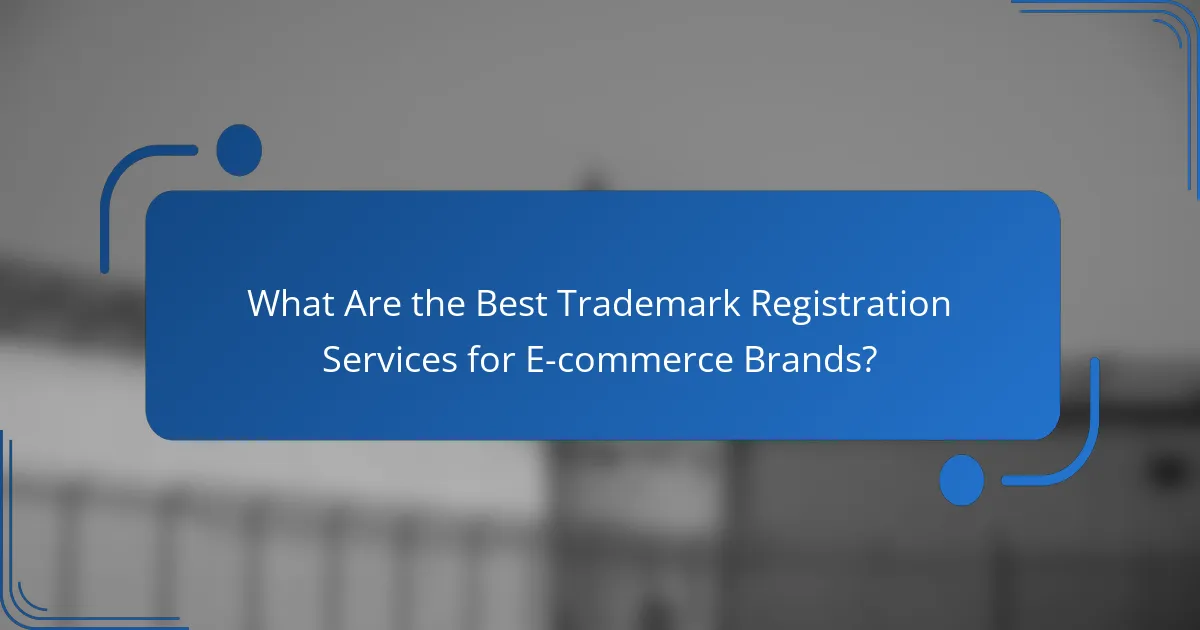
What Are the Best Trademark Registration Services for E-commerce Brands?
The best trademark registration services for e-commerce brands provide efficient, cost-effective solutions tailored to the unique needs of online businesses. These services typically streamline the application process, offer legal guidance, and ensure compliance with relevant regulations.
LegalZoom
LegalZoom is a popular choice for trademark registration, known for its user-friendly platform and comprehensive services. It offers a range of packages that include trademark searches, application filing, and legal advice, making it suitable for e-commerce brands looking for a one-stop solution.
Pricing for LegalZoom starts around $249 plus government fees, which can vary based on the trademark class. Brands should consider their specific needs and the level of legal support required when selecting a package.
Trademarkia
Trademarkia specializes in trademark searches and registrations, providing a vast database for users to check existing trademarks. This service is particularly beneficial for e-commerce brands that want to ensure their brand name is unique before applying.
Trademarkia’s pricing is competitive, starting at approximately $199 for basic registration services. The platform also offers a user-friendly interface, making it easy for brands to navigate the registration process independently.
Rocket Lawyer
Rocket Lawyer combines legal services with trademark registration, offering a subscription model that provides ongoing legal support. This can be advantageous for e-commerce brands that may need additional legal assistance beyond just trademark registration.
With plans starting around $39.99 per month, Rocket Lawyer allows brands to access legal documents and consultations, making it a flexible option for businesses looking to protect their intellectual property over time.
IPWatchdog
IPWatchdog is a resource-rich platform that offers trademark registration services alongside extensive educational content about intellectual property. This is ideal for e-commerce brands that want to learn more about trademark law while securing their trademarks.
While IPWatchdog does not provide direct registration services, it connects users with experienced attorneys who can assist with the process. Brands should be prepared for varying costs depending on the attorney’s fees and the complexity of their trademark application.
Trademark Engine
Trademark Engine simplifies the trademark registration process with a straightforward online platform. It offers a step-by-step guide to help e-commerce brands file their applications efficiently.
Starting at around $199, Trademark Engine provides a cost-effective solution for businesses looking to register their trademarks without extensive legal fees. Brands should ensure they understand the application process and consider utilizing the platform’s resources for a smoother experience.
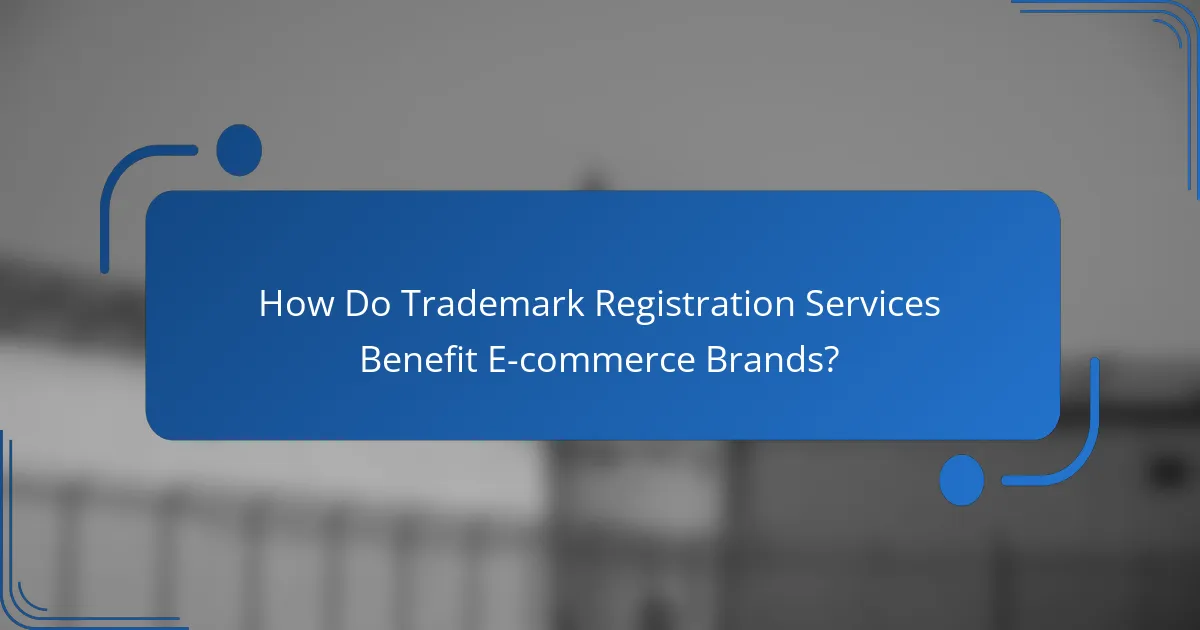
How Do Trademark Registration Services Benefit E-commerce Brands?
Trademark registration services provide essential advantages for e-commerce brands by safeguarding their unique identities and enhancing their market presence. These services help businesses secure legal rights to their trademarks, which can lead to increased customer trust and protection against infringement.
Brand protection
Trademark registration is crucial for brand protection as it legally secures a company’s name, logo, or slogan from unauthorized use. This prevents competitors from using similar marks that could confuse consumers and dilute brand identity. E-commerce brands should consider registering their trademarks in all relevant jurisdictions to ensure comprehensive protection.
Additionally, having a registered trademark allows brands to take legal action against infringers, which can deter potential violations. This proactive approach is vital in the competitive e-commerce landscape, where brand reputation can significantly impact sales.
Increased credibility
Registering a trademark enhances an e-commerce brand’s credibility in the marketplace. Customers are more likely to trust a brand that has taken steps to protect its identity, viewing it as more professional and established. This trust can lead to increased customer loyalty and repeat purchases.
Moreover, a registered trademark can serve as a valuable asset during negotiations with partners or investors, as it demonstrates a commitment to brand integrity and long-term business strategy. E-commerce brands should leverage this credibility in their marketing efforts to attract and retain customers.
Legal support
Trademark registration services provide essential legal support for e-commerce brands, offering guidance on the registration process and potential challenges. These services help businesses navigate complex trademark laws and ensure compliance with local regulations, which can vary significantly across regions.
In case of disputes, having a registered trademark can simplify legal proceedings, as it serves as proof of ownership. E-commerce brands should seek professional legal assistance to maximize the benefits of trademark registration and effectively manage any potential infringements.
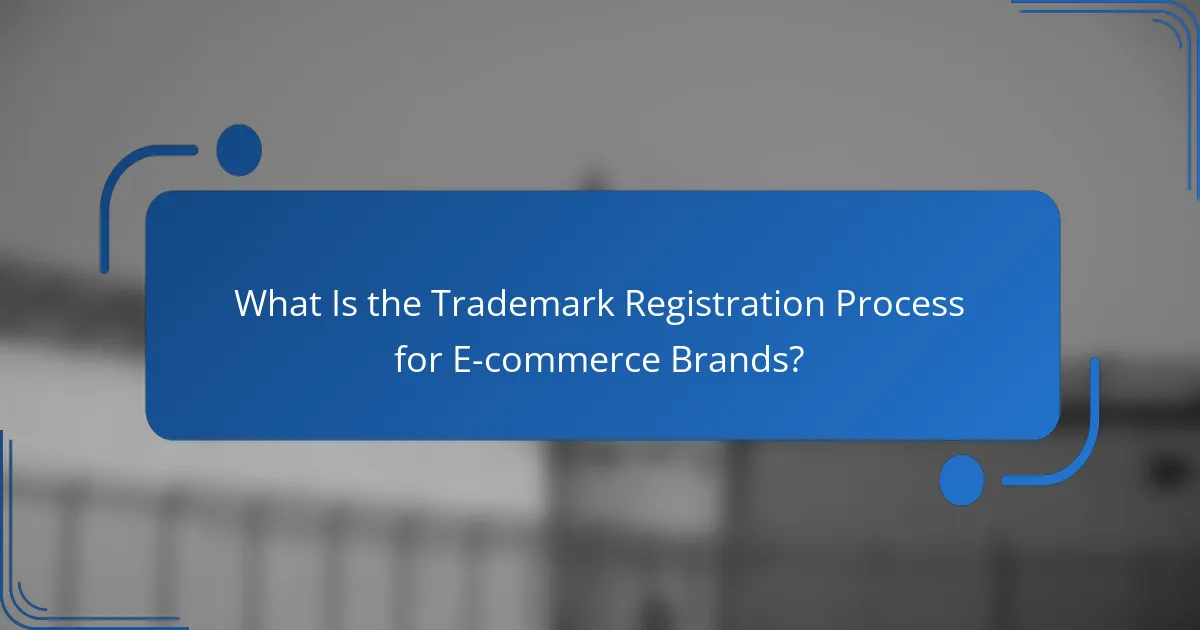
What Is the Trademark Registration Process for E-commerce Brands?
The trademark registration process for e-commerce brands involves several key steps to ensure that a brand’s name, logo, or slogan is legally protected. This process typically includes searching for existing trademarks, filing an application, responding to any office actions, and ultimately receiving registration if all requirements are met.
Search for existing trademarks
Before filing for a trademark, e-commerce brands should conduct a thorough search for existing trademarks to avoid potential conflicts. This can be done through the United States Patent and Trademark Office (USPTO) database or similar resources in other countries. Brands should look for trademarks that are similar in name or appearance to ensure their application is unique.
Using tools like the Trademark Electronic Search System (TESS) can help identify potential issues early on. It’s advisable to consult with a trademark attorney to interpret search results and assess the risk of infringement.
File the application
Once the search is complete, the next step is to file the trademark application. This involves completing the appropriate forms and paying the required fees, which can vary significantly based on the jurisdiction and the number of classes of goods or services covered. In the U.S., fees typically range from $250 to $750 per class.
Brands must provide detailed information about the trademark, including its intended use and any associated goods or services. Accurate and complete applications are crucial to avoid delays or rejections.
Respond to office actions
After filing, the trademark office may issue office actions, which are official letters requesting additional information or clarifications. E-commerce brands must respond to these actions promptly, usually within six months, to keep their application active.
Common issues that may arise include objections based on similarity to existing trademarks or insufficient descriptions of goods. Addressing these concerns effectively often requires legal expertise, so consulting a trademark attorney is recommended.
Receive registration
If the application meets all requirements and any office actions are resolved satisfactorily, the trademark office will grant registration. This process can take several months to over a year, depending on the jurisdiction and any complications that arise.
Once registered, the trademark provides legal protection, allowing the brand to enforce its rights against unauthorized use. E-commerce brands should actively monitor their trademarks and renew them as required, typically every 10 years in the U.S., to maintain their protections.
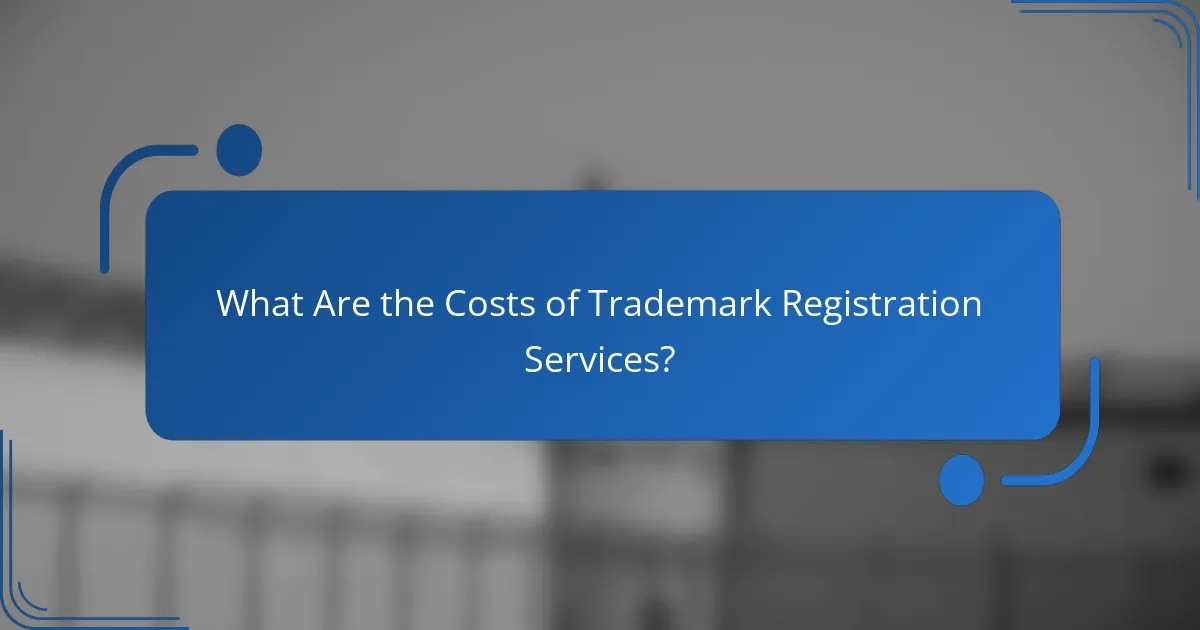
What Are the Costs of Trademark Registration Services?
The costs of trademark registration services can vary significantly based on the provider, the complexity of the application, and additional legal support needed. Generally, businesses should budget for service fees, government filing fees, and potential additional legal fees to ensure comprehensive coverage.
Service fees
Service fees for trademark registration typically range from a few hundred to several thousand dollars, depending on the service provider and the level of assistance required. Many e-commerce brands opt for professional services to navigate the complexities of trademark law, which can justify higher fees.
When choosing a service, consider what is included in the fee. Some providers offer packages that encompass searches, filings, and monitoring, while others may charge separately for each service. Always clarify what services are provided before committing to a provider.
Government filing fees
Government filing fees for trademark registration can vary by country and the number of classes of goods or services you wish to register. In the United States, for example, fees can range from approximately $250 to $750 per class, depending on the filing method chosen.
It’s essential to check the specific fees applicable in your jurisdiction, as they can change. For instance, in the European Union, the basic fee for a trademark application is around €850 for one class, with additional costs for more classes.
Additional legal fees
Additional legal fees may arise if you require expert assistance for trademark searches, responses to office actions, or opposition proceedings. These fees can add several hundred to several thousand dollars to your total costs, depending on the complexity of your case.
To manage these costs effectively, consider consulting with a trademark attorney early in the process. They can provide insights into potential challenges and help you prepare a robust application, potentially saving you money in the long run by avoiding common pitfalls.
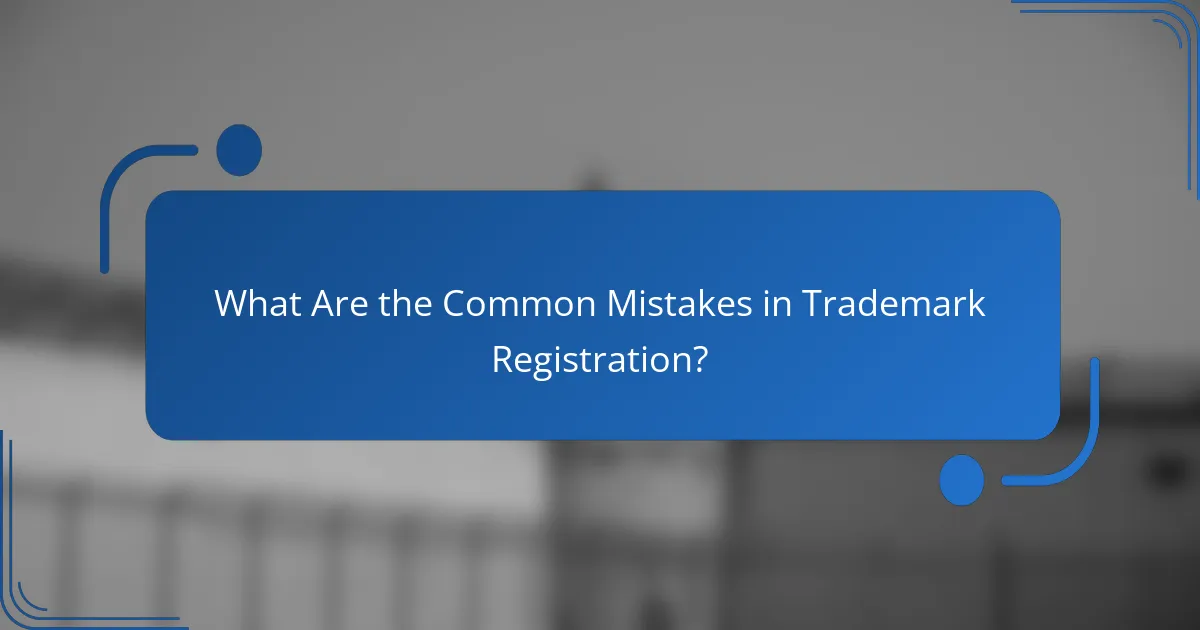
What Are the Common Mistakes in Trademark Registration?
Common mistakes in trademark registration can lead to delays, rejections, or loss of rights. Understanding these pitfalls is crucial for e-commerce brands aiming to protect their intellectual property effectively.
Inadequate search
Conducting an inadequate search before filing a trademark application can result in conflicts with existing trademarks. Brands should perform comprehensive searches to identify similar marks that could cause confusion. Utilizing databases such as the USPTO’s TESS or other country-specific registries can help avoid costly mistakes.
Consider hiring a trademark attorney or using professional search services to ensure thoroughness. This upfront investment can save time and resources in the long run.
Incorrect application details
Filing with incorrect application details is a frequent error that can lead to outright rejection. Ensure that the trademark name, description of goods or services, and applicant information are accurate and complete. Minor typos or omissions can result in significant delays.
Double-check all entries before submission and consider using a checklist to verify that all required fields are filled correctly. This attention to detail can prevent unnecessary complications.
Failure to respond to office actions
Failure to respond to office actions from trademark offices can jeopardize your application. If the trademark office raises concerns or requests additional information, timely responses are essential. Ignoring these communications can lead to abandonment of the application.
Set reminders for response deadlines and consult with a trademark attorney if you receive an office action. Being proactive in addressing issues can help secure your trademark rights without unnecessary setbacks.
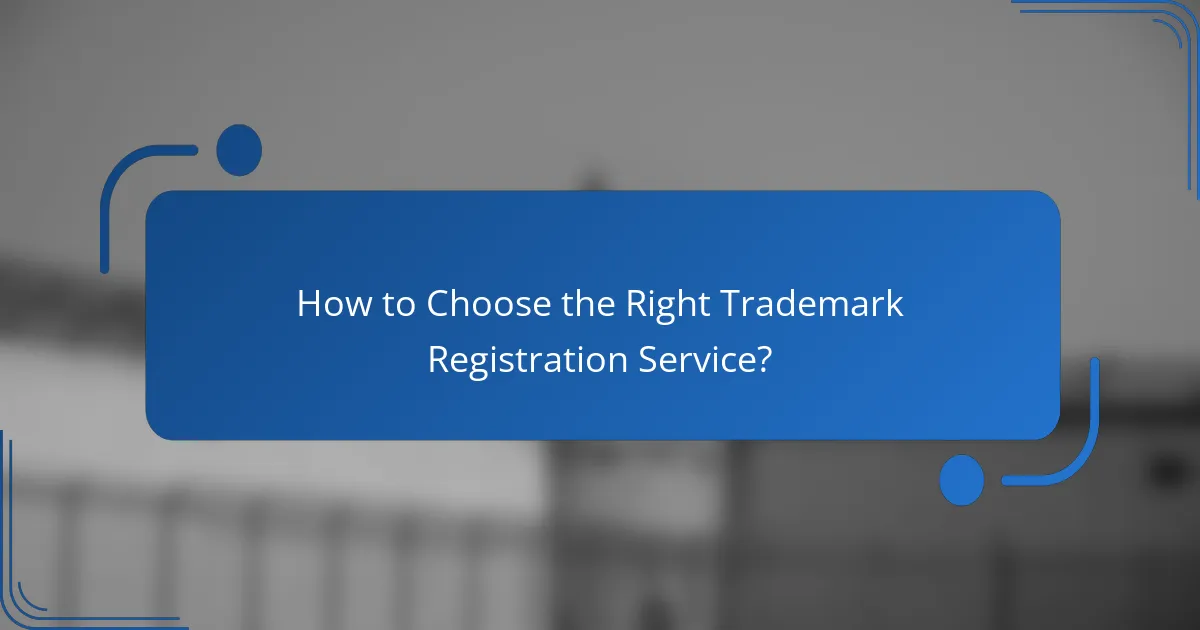
How to Choose the Right Trademark Registration Service?
Choosing the right trademark registration service is crucial for e-commerce brands to protect their intellectual property effectively. Key factors include understanding the service offerings, costs, and the level of support provided throughout the registration process.
Consider Your Budget
When selecting a trademark registration service, budget is a primary consideration. Services can range from a few hundred to several thousand dollars, depending on the complexity of your trademark and the level of assistance required. Compare pricing structures, including any hidden fees, to find a service that fits your financial plan.
For example, some services offer basic packages for straightforward trademarks, while others provide comprehensive support for more complex applications. Evaluate what is included in each package to ensure you are getting value for your investment.
Evaluate Service Features
Different trademark registration services offer varying features that can impact your decision. Look for services that provide comprehensive trademark searches, application filing, and ongoing monitoring. Some may also offer legal consultations or assistance with international registrations.
For instance, if you plan to expand your e-commerce brand internationally, choose a service that specializes in global trademark protection. This can save you time and potential legal issues down the line.
Check Customer Support and Reviews
Effective customer support is essential when navigating trademark registration. Research the responsiveness and availability of support from potential services. Look for reviews and testimonials from other e-commerce brands to gauge their experiences.
Consider reaching out with questions before making a decision. A service that provides clear, prompt answers can indicate a commitment to customer satisfaction and support throughout the registration process.
Understand the Application Process
Familiarize yourself with the trademark application process as it can vary by service. Most services will guide you through the necessary steps, but understanding the timeline and requirements can help you manage expectations. The application process typically involves a trademark search, application preparation, and submission.
Be aware that the entire process can take several months, so plan accordingly. Some services may offer expedited options for an additional fee, which can be beneficial if you need protection quickly.

